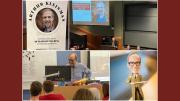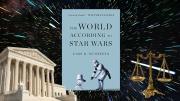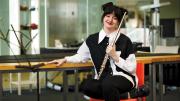Taming the Beloved Beast: How Medical Technology Costs Are Destroying Our Health Care System, by Daniel Callahan, Ph. D. ’65 (Princeton, $29.95). A preeminent medical ethicist confronts the problem of life-saving and useful technologies—“the most visible and attractive feature of contemporary medicine”—the introduction or more intensive use of which account for fully half the annual increase in healthcare costs.
The Art Student's War, by Brad Leithauser ’75, J.D. ’79 (Knopf, $28.95). The poet, essayist, and now six-time novelist channels his hometown (Detroit) and mother-in-law (who as a teenager drew portraits of hospitalized soldiers) in a lovingly detailed evocation of the 1940s, from the domestic scale to the sweep of World War II. It begins with an observation at a streetcar stop: “[T]he young soldier who climbs aboard with some difficulty—he looks new to his crutches—is surpassingly handsome.”
On Rumors: How Falsehoods Spread, Why We Believe Them, What Can Be Done , by Cass R. Sunstein (Farrar, Straus and Giroux, $18). A brief reflection by the Frankfurter professor of law, who got brutal first-hand experience in his subject during his protracted confirmation hearings to serve as President Obama’s administrator of the Office of Information and Regulatory Affairs.
The Woman Who Named God: Abraham’s Dilemma and the Birth of Three Faiths , by Charlotte Gordon ’84 (Little, Brown, $27.99). A close examination of the interwoven stories of Abraham, Sarah, Hagar, Isaac, Ishmael, and God, and their collective, equally interwoven and riven progeny: Judaism, Christianity, and Islam.
The Case for Books: Past, Present, and Future, by Robert Darnton, Pforzheimer University Professor and director of the Harvard University Library (PublicAffairs, $23.95). Collected essays (also available, incidentally, as an e-book and audiobook), ranging from sharp critiques of the Google Book Search monopoly back to the author’s initial case for making the history of books a distinct field of study.
Good Without God: What a Billion Nonreligious People Do Believe, by Greg M. Epstein, M.T.S. ’07 (William Morrow, $25.99). “It is not easy to live a good life or be a good person—with or without a god,” writes the author, Harvard’s Humanist chaplain. He is concerned with the “relevant and interesting” question of “why we can be good without God,” and the “absolutely crucial” question of how to do so.
At Home in the Law: How the Domestic Violence Revolution Is Transforming Privacy strong>, by Jeannie Suk, J.D. ’02, assistant professor of law (Yale, $55). The pursuit of the protection of women from abuse has had unintended consequences: shrinking the realm of privacy, and reducing women’s autonomy relative to the power of the state.
Boulevard of Broken Dreams, by Josh Lerner, Schiff professor of investment banking (Princeton, $27.95). As government bails out old enterprises (banks, General Motors), might it stimulate growth by encouraging entrepreneurship and venture capital? The Harvard Business School professor says there is a public role, but it requires a delicate touch, broad vision, and patience.
A Passion for Nature: Thomas Jefferson and Natural History (Monticello Monograph) , by Keith Thomson, Ph.D. ’63 (University of North Carolina/Thomas Jefferson Foundation, $14.95 paper). The author, professor of natural history emeritus at Yale, documents the president’s infatuation with nature, from his Albemarle County boyhood through his celebrated Garden Book to his instructions to Lewis and Clark. Profusely illustrated in black and white.
Using Visual Evidence, edited by Richard Howells ’89 and Robert W. Matson (McGraw-Hill, $47.95 paper). Howells, of King’s College London, who studies media and creative industries, and Matson, of the University of Pittsburgh, curate essays on telling history through images, from painting and political cartoons to movies, advertising, and Star Trek.
Stubborn as a Mule, by Richard H. Fallon Jr., Tyler professor of constitutional law (Strategic, $23.75). The legal scholar commits a funny novel, concerning Brewster College, its right-wing economist president, Peter MacTeague, and the undoing of his political aspirations when White, the mascot mule, is kidnapped.


















